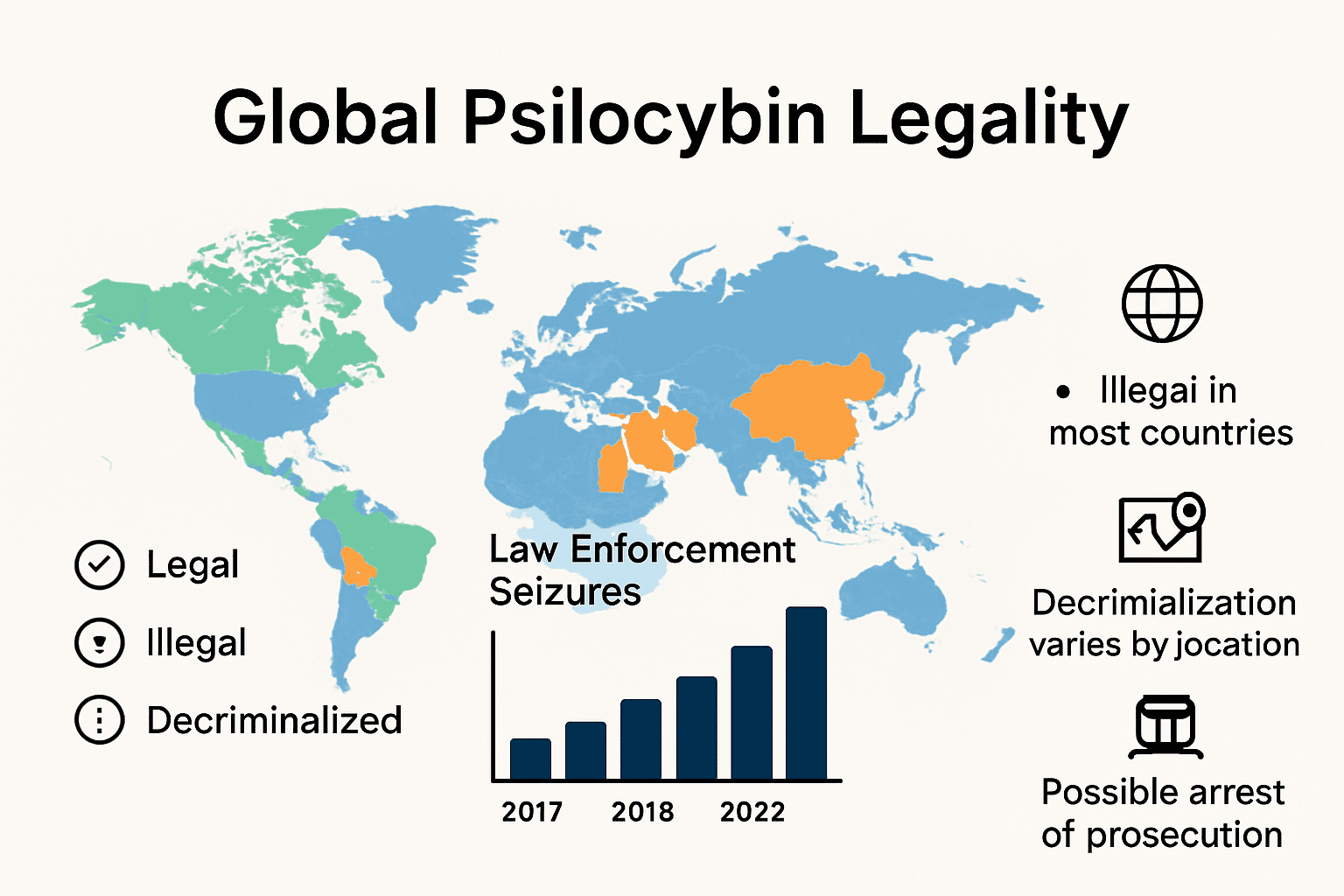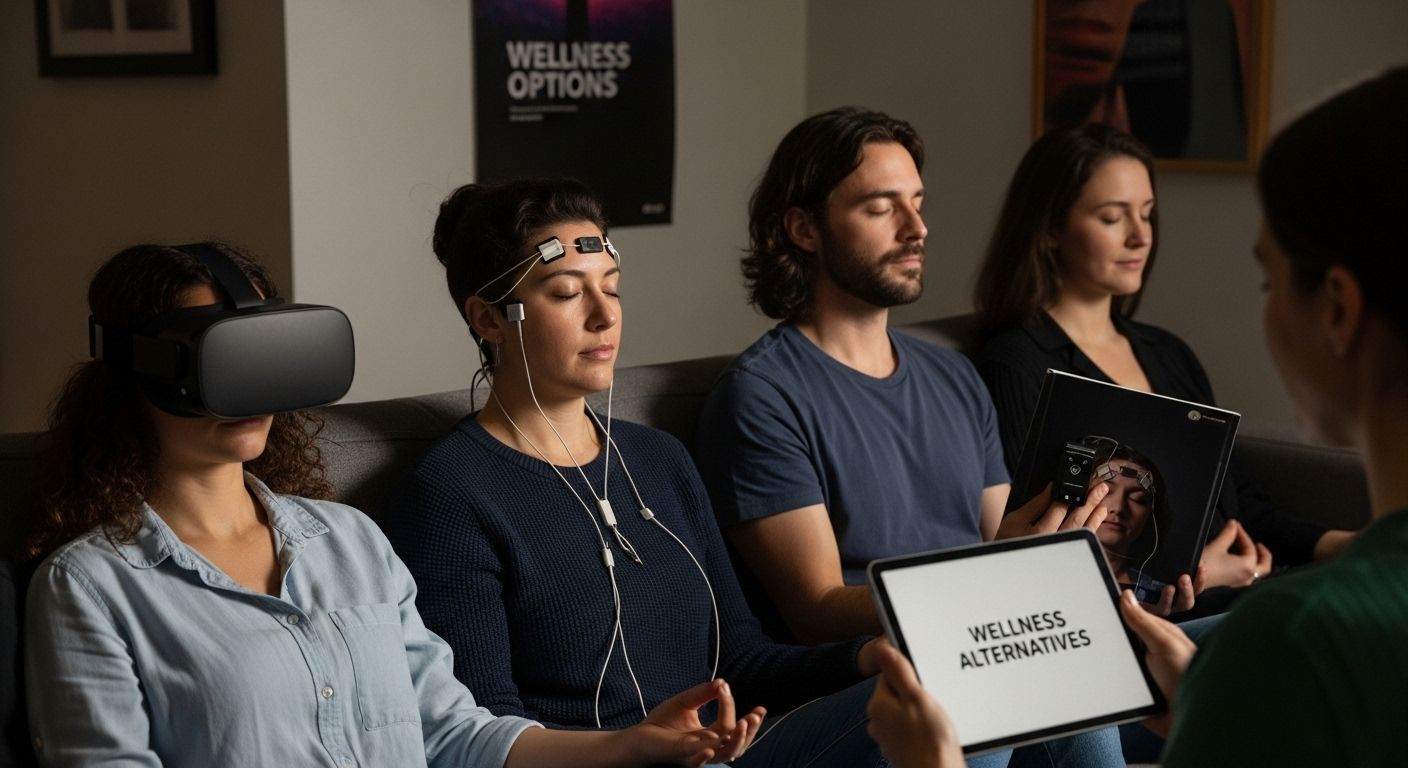People are looking for new ways to foster personal growth and wellness, and psilocybin mushrooms come up in more conversations than ever. The interest is so strong that law enforcement seizures of psilocybin mushrooms jumped from 402 to 1,396 incidents between 2017 and 2022, which is a nearly 250 percent increase. You might think these numbers are simply about a trend taking off, but the real surprise is how traveling with psilocybin can carry risks that go far beyond what most people expect.
Table of Contents
- Understanding Psilocybin Laws Worldwide
- Risks and Consequences When Traveling
- Safe Alternatives for Wellness Enthusiasts
- Tips for Mindful and Legal Travel Choices
Quick Summary
| Takeaway | Explanation |
|---|---|
| Know psilocybin legality in your destination | Research and understand local laws before traveling to avoid severe legal consequences. |
| Traveling with psilocybin carries risks | Border laws are strict, and possession can lead to criminal charges, fines, or imprisonment. |
| Consider safe wellness alternatives | Explore technology-based and holistic options for personal growth without legal risks associated with psilocybin. |
| Assess your personal health before travel | Evaluate your mental health to ensure travel readiness and discuss plans with a healthcare provider. |
| Prepare for legal and personal safety | Maintain documentation, know local regulations, and establish emergency contacts to ensure safe travel experiences. |
Understanding Psilocybin Laws Worldwide
Navigating the complex legal landscape of psilocybin requires careful attention to global regulations that vary dramatically between jurisdictions. The legal status of psilocybin mushrooms remains highly fragmented, with significant differences in approach across countries and even between different regions within the same nation.
Global Legal Classification
Psilocybin is internationally classified as a controlled substance, primarily regulated under the United Nations Convention on Psychotropic Substances of 1971. The Journal of the American Academy of Psychiatry and the Law highlights that most countries classify psilocybin as a Schedule I substance, indicating it is considered to have a high potential for abuse and no recognized medical value under traditional legal frameworks.
However, recent legislative developments are challenging these traditional perspectives. Reason Foundation’s policy roundup reveals a growing trend of jurisdictions reconsidering psilocybin’s legal status, particularly for therapeutic and research purposes. For instance, Oregon has been at the forefront of progressive psychedelic policy, establishing a regulated framework for psilocybin services through state-approved protocols.
Traveling with Psilocybin: Critical Considerations
Traveling with psilocybin presents significant legal risks. Most countries maintain strict prohibitions against possession, transportation, or distribution of psilocybin-containing substances. Individuals attempting to cross international or even state borders with psilocybin risk severe legal consequences, including potential criminal charges, substantial fines, and potential imprisonment.
Key travel-related risks include:
- Customs Inspections: Border control agencies have sophisticated screening processes designed to detect controlled substances.
- International Legal Variations: Laws differ dramatically between countries, making compliance extremely complex.
- Potential Criminal Prosecution: Possession can result in immediate legal action, regardless of intended use.
Because legal landscapes are rapidly evolving, our comprehensive guide on psilocybin legality provides updated insights for those seeking to understand current regulatory environments. Travelers must prioritize thorough research and legal consultation before considering any transportation of psilocybin-containing substances.
Understanding these legal nuances is crucial. While scientific research continues to explore psilocybin’s potential therapeutic benefits, current legal frameworks remain restrictive. Responsible individuals must remain informed about local and international regulations to avoid unintended legal complications.
Risks and Consequences When Traveling
Traveling with psilocybin presents a complex web of legal and personal risks that extend far beyond simple possession. The potential consequences can be life-altering, ranging from immediate legal challenges to long-term personal and professional repercussions.

Legal Enforcement and Seizure Risks
The National Institute on Drug Abuse reports a significant increase in law enforcement seizures of psilocybin mushrooms, highlighting the growing scrutiny of these substances. Between 2017 and 2022, seizures rose from 402 to 1,396 incidents, underscoring the heightened enforcement efforts across jurisdictions.
Legal consequences can be severe and multifaceted. Depending on the location, individuals caught with psilocybin might face:
- Criminal Charges: Potential felony classifications
- Substantial Fines: Ranging from thousands to tens of thousands of dollars
- Potential Imprisonment: Varying from months to years
- International Travel Restrictions: Potential limitations on future travel
Medical and Personal Implications
Beyond legal risks, traveling with psilocybin carries significant medical and personal complications. The Government Accountability Office emphasizes that while psychedelics show promise in treating conditions like PTSD and depression, substantial research is still needed to fully understand their adverse effects and potential risks.
Personal consequences can include:
- Professional Reputation Damage: Potential job loss or career limitations
- Immigration Challenges: Potential visa denials or deportation
- Personal Record Complications: Long-term impact on background checks
Navigating Complex Exemption Landscapes
Some jurisdictions offer nuanced approaches to psychedelic substances. The U.S. Government Accountability Office notes that religious exemptions to controlled substance regulations exist, though the process is complex and time-consuming. Petitions for such exemptions can take between 8 months and 3 years to resolve, highlighting the intricate legal frameworks surrounding these substances.
Learn more about managing microdosing risks for comprehensive insights into responsible substance management.
Ultimately, the risks of traveling with psilocybin far outweigh potential benefits. Individuals must prioritize legal compliance, personal safety, and thorough understanding of local and international regulations before considering transportation of any controlled substances.
For travelers considering psilocybin, understanding the potential legal, medical, and personal risks is crucial. The following table organizes the major risks and consequences highlighted in the article.
| Risk Type | Potential Consequences |
|---|---|
| Legal Risks | Criminal charges, fines, imprisonment, travel restrictions |
| Medical Risks | Unknown adverse effects, especially with mental health history |
| Personal Risks | Reputation damage, job loss, immigration issues, record complications |
| Enforcement Risks | Customs detection, border seizures, increased scrutiny |
Safe Alternatives for Wellness Enthusiasts
Wellness enthusiasts seeking transformative experiences can explore numerous safe and legal alternatives that provide similar cognitive and emotional benefits to psilocybin without the associated legal risks. These innovative approaches leverage cutting-edge technologies and holistic practices to support mental wellness and personal growth.
Technology-Enabled Wellness Experiences
Research exploring Virtual Reality (VR) technologies reveals groundbreaking approaches to wellness that mimic some psychological effects of psychedelics. A study published in November 2024 demonstrated how high-fidelity VR environments can simulate immersive experiences that reduce stress and improve cognitive functioning.
Notably, the emerging field of consciousness technologies offers exciting alternatives:
- Virtual Reality Journeys: Immersive experiences that induce self-transcendent states
- Neurofeedback Training: Techniques for regulating brain activity
- Guided Meditative Simulations: Technology-assisted mindfulness practices
The Isness-distributed (Isness-D) VR framework represents a breakthrough, creating shared experiences that generate ego-attenuation similar to psychedelic experiences. Participants reported profound states of connectedness without consuming any controlled substances.
Neurotechnological Wellness Solutions
The National Institutes of Health highlights Transcranial Magnetic Stimulation (TMS) as a promising non-invasive neurotechnology capable of altering brain cortical activity. TMS has demonstrated effectiveness in addressing various mental health conditions, offering a scientifically validated alternative for individuals seeking cognitive and emotional balance.
Key neurotechnological approaches include:
- Transcranial Magnetic Stimulation: Precise brain activity modulation
- Neurofeedback Protocols: Real-time brain state optimization
- Biofeedback Technologies: Physiological self-regulation techniques
Holistic and Natural Wellness Pathways
Beyond technological solutions, traditional wellness practices offer powerful alternatives. Our comprehensive guide on natural wellness strategies explores integrative approaches that support mental clarity and emotional resilience.
Holistic wellness strategies encompass:
- Meditation and Mindfulness: Cultivating present-moment awareness
- Exercise and Movement: Neurochemical balance through physical activity
- Nutrition and Supplementation: Supporting cognitive function naturally
These alternatives provide safe, legal pathways to personal transformation. By embracing innovative technologies and time-tested wellness practices, individuals can achieve profound psychological insights and emotional growth without compromising legal standing or personal safety.
To help readers compare the most notable safe and legal wellness alternatives discussed in the article, the following table summarizes the different approaches, key benefits, and example methods for each.
| Wellness Approach | Key Benefits | Example Methods |
|---|---|---|
| Technology-Enabled Experiences | Reduces stress, self-transcendence | Virtual Reality (VR) journeys, guided meditations |
| Neurotechnological Solutions | Brain activity modulation, mood regulation | Transcranial Magnetic Stimulation (TMS), neurofeedback |
| Holistic and Natural Pathways | Mental clarity, emotional resilience | Meditation, exercise, nutrition |

Tips for Mindful and Legal Travel Choices
Traveling requires careful consideration of legal and personal wellness strategies, especially when navigating complex regulatory environments surrounding substances like psilocybin. Understanding how to make informed, responsible choices can help travelers maintain their well-being while staying compliant with local and international laws.
Understanding Substance Risks and Legal Implications
The National Institute on Drug Abuse highlights that psilocybin can cause significant perceptual distortions, including altered sights, sounds, and a disrupted sense of time and space. These potential effects underscore the importance of making mindful travel decisions.
Key considerations for responsible travelers include:
- Legal Research: Thoroughly investigate destination-specific regulations
- Personal Health Assessment: Understand individual psychological vulnerabilities
- Risk Mitigation: Develop comprehensive travel plans that prioritize safety
Psychological Safety and Preparedness
Human hallucinogen research emphasizes the critical importance of psychological screening before engaging with substances like psilocybin. Travelers must carefully evaluate their mental health background, particularly if there is a personal or family history of psychotic disorders.
Psychological preparedness strategies include:
- Mental Health Screening: Comprehensive self-assessment
- Professional Consultation: Discuss travel plans with healthcare providers
- Stress Management: Develop coping mechanisms for potential travel challenges
Proactive Legal and Personal Protection
Law enforcement data reveals a significant increase in psilocybin-related seizures, highlighting the growing legal scrutiny surrounding these substances. Learn more about mindful wellness strategies to support your travel experiences safely and legally.
Protective travel strategies encompass:
- Documentation Management: Carry only legal wellness documentation
- Communication Preparedness: Understand local legal resources
- Emergency Contact Planning: Establish support networks
Travelers must recognize that personal wellness extends beyond substance use. By prioritizing legal compliance, psychological safety, and informed decision-making, individuals can create meaningful travel experiences that respect both personal boundaries and regulatory frameworks.
Ultimately, the most responsible approach involves continuous education, self-reflection, and a commitment to making choices that support holistic well-being while maintaining legal integrity.
Frequently Asked Questions
Can I travel with psilocybin mushrooms?
Traveling with psilocybin mushrooms is illegal in most jurisdictions. It’s important to research and understand the local laws of your destination, as possession can lead to severe legal consequences, including criminal charges, fines, or imprisonment.
What are the risks associated with traveling with psilocybin?
The risks include legal enforcement actions like confiscation at customs, potential criminal prosecution, and the possibility of long-term personal consequences such as damage to your professional reputation or immigration challenges.
Are there safe alternatives to psilocybin for personal growth while traveling?
Yes, there are numerous safe alternatives, including technology-enabled wellness experiences like Virtual Reality, neurotechnological solutions such as Transcranial Magnetic Stimulation (TMS), and holistic practices like meditation and exercise that support mental wellness without legal risks.
How can I prepare for legal and personal safety when traveling?
To prepare, thoroughly research destination-specific laws, assess your psychological readiness, develop a comprehensive travel plan prioritizing safety, manage legal documentation, and establish emergency contacts to navigate any challenges that may arise.
Safely Experience Microdosing for Wellness and Clarity
Are you worried about the confusing legal landscape and personal risks of traveling with psilocybin? The article highlights how strict regulations, border seizures, and medical uncertainties can turn a journey into a stressful situation. Many wellness seekers want the benefits of psilocybin for mental clarity and emotional balance. However, legal dangers can make accessing these benefits difficult and even risky. If you have questions about legality, dosing, or safety, you do not need to compromise your peace of mind.

Discover a safer path with Kind Stranger. Our platform offers thoughtfully microdosed psilocybin products, from capsules to gummies, designed for wellness-focused individuals in Canada. Explore our FAQ and educational resources to learn how you can benefit from plant-based support without legal hassle or travel stress. Choose confidence and clarity. Visit https://kindstranger.club now to find safe, convenient options that fit your lifestyle.


Comments
There are no comments yet.